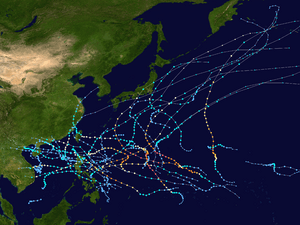2009 Pacific typhoon season facts for kids
 |
|
| Season summary map | |
| First storm formed | January 3, 2009 |
|---|---|
| Last storm dissipated | December 8, 2009 |
| Strongest storm | Nida – 905 hPa (mbar), 215 km/h (130 mph) (10-minute sustained) |
| Tropical depressions | 41 |
| Total storms | 22 official 2 unofficial |
| Typhoons | 13 official, 2 unofficial |
| Super typhoons | 5 (unofficial) |
| Total fatalities | >2242 total, 228 missing |
| Total damage | $12.227 billion (2009 USD) |
| Pacific typhoon seasons 2007, 2008, 2009, 2010, 2011. |
|
| Related article | |
|
|
The 2009 Philippine region typhoon season was a time when many powerful storms formed in the western Pacific Ocean. These storms are called tropical cyclones, which include typhoons and tropical storms. The season lasted throughout 2009, but most of these storms happened between May and November.
The Philippine Atmospheric, Geophysical and Astronomical Services Administration (PAGASA) is a group in the Philippines that names tropical cyclones. They name any storm that enters or forms in their area of responsibility. These names are mostly used within the Philippines. During this season, 39 tropical depressions started in the western Pacific. Two more formed outside this area but then moved into it.
Contents
Understanding Storms in 2009
What is a Tropical Cyclone?
A tropical cyclone is a huge spinning storm system. It forms over warm ocean waters. These storms bring strong winds and heavy rain. Depending on where they form, they can be called hurricanes, typhoons, or cyclones. In the Western Pacific, they are often called typhoons.
How Storms Get Their Names
PAGASA gives special names to storms that affect the Philippines. This helps people track them and understand warnings. These names are different from the international names given to storms. For example, a storm might have an international name like "Nida" but also a Philippine name like "Ondoy."
Storms That Affected the Philippines
Many storms were named by PAGASA in 2009. These names helped people identify and prepare for each storm. Here are some of the storms that formed or entered the Philippine area of responsibility:
- Tropical Depression Auring
- Tropical Depression Bising
- Typhoon Crising
- Typhoon Dante
- Typhoon Emong
- Tropical Storm Feria
- Tropical Depression Gorio
- Tropical Depression Huaning
- Typhoon Isang
- Tropical Depression Jolina
- Tropical Storm Kiko
- Tropical Storm Labuyo
- Tropical Depression Maring
- Typhoon Nando
- Typhoon Ondoy
- Typhoon Pepemg
- Typhoon Quedan
- Typhoon Ramil
- Tropical Storm Santi
- Tropical Depression Tino
- Tropical Depression Urduja
- Tropical Depression Vinta
More Information
 In Spanish: Temporada de tifones en el Pacífico de 2009 para niños
In Spanish: Temporada de tifones en el Pacífico de 2009 para niños
 | Selma Burke |
 | Pauline Powell Burns |
 | Frederick J. Brown |
 | Robert Blackburn |

